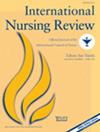Professional values gained in postgraduate nursing education from the perspectives of master's and doctorate graduates: A mixed-methods study
Abstract
Aim
To determine the professional values of graduates of master's and doctoral programs in nursing and their views on the contribution of postgraduate education to their professional values.
Background
In postgraduate education, which is an important catalyst of professional identity development, a professional is expected to specialize in a field, get into more depth professionally, internalize professional values, and reflect and strengthen these values. To shed light on this expectation, more information is needed to assess the impact of postgraduate education on professional values.
Methods
A convergent parallel mixed-methods design was used. Data were collected for the quantitative part of the study for 385 graduates of postgraduate nursing education programs in Turkey who were selected using the snowball sampling method, while the maximum variation sampling method was used to collect data from 12 individuals for the qualitative part of the study. The Nurses Professional Values Scale (NPVS) and a Semi-Structured Interview Form were used to collect data in October-December 2022. The quantitative data obtained in the study were analyzed using the SPSS software, and the qualitative data were analyzed using the MAXQDA software.
Results
The mean total NPVS score of the participants was 130.32 ± 21.34 (possible range: 31–155). Among all dimensions, the highest mean score of the participants was in the caring dimension, followed by professionalism and activism. There were significant differences in the NPVS total and subscale scores of the participants based on their views on the contributions of age, institution where they worked, marital status, position at work, and postgraduate education to the acquisition of professional values. In the qualitative dimension of the study, two main themes were identified. One of these themes was the theme of professional values in postgraduate nursing education that covered the categories of professional values gained through postgraduate education, professional values that a nurse who has completed postgraduate education should have, and professional values in postgraduate nursing education. The second theme was the theme named recommendations for providing nurses with professional values through postgraduate education. The integration of data from both components indicated that the qualitative interviews enriched the quantitative findings.
Conclusion
It was concluded that postgraduate nursing education programs contribute greatly to the professional values of graduates and strengthen their professional values.
Implications for nursing and health policy
For the future of nursing, increasing professional strengths and visibility is significantly associated with professional values. This situation requires nurses with strong professional values. Graduate education programs in nursing should be developed in this direction and focus on development of professional values.

 求助内容:
求助内容: 应助结果提醒方式:
应助结果提醒方式:


